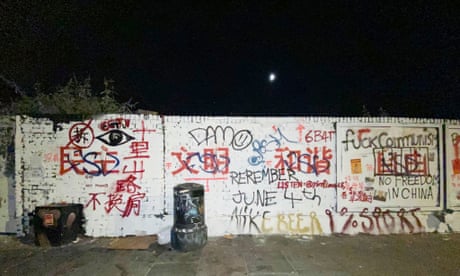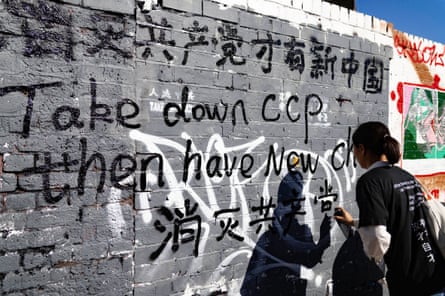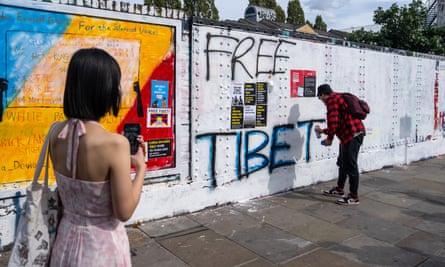Royal College of Art student Wang Hanzheng thought a Brick Lane wall was better than a gallery
Wang Hanzheng said the mural was a ‘silent reminder of the oppression of thought’ in China.
Photograph: David Levene/The Guardian
Geneva Abdul
@GenevaAbdul
THE GUARDIAN
Wed 30 Aug 2023 06.00 BST
When Wang Hanzheng, a Chinese student at the Royal College of Art, attended a graduate show in a warehouse on Brick Lane in east London in July, he found the space crowded, unimaginative and unfit for presenting art.
It was with this in mind that at 11pm one night earlier this month Wang and a team of 22 others painted a Chinese political slogan in bold red characters along a nearby wall stretching nearly 100 metres

Chinese political slogans spark graffiti free-for-all on east London wall
The artwork – which spelled out the Chinese government’s “socialist core values”, including the words prosperity, democracy and freedom – was designed to be a “silent reminder of the oppression of thought, press freedom and free speech that is still rampant in China in 2023”, the artists said.
It provoked others to graffiti over it with references to the Tiananmen Square massacre in 1989, and the phrases “Free Taiwan”, “Free Tibet” and “Free Uyghurs”. But in a move described by some as ironically totalitarian, Tower Hamlets council swiftly painted over the wall’s mess of slogans and issued Wang a £50 fine.
“Contemporary art is all about doubting everything and having a rebellious spirit,” said the 27-year-old, who also goes by the name Yi Que. In that sense the work – concerned with democracy, free speech and the polarised ideologies of Chinese and UK cultures – was even more successful for him than expected.

When Wang Hanzheng, a Chinese student at the Royal College of Art, attended a graduate show in a warehouse on Brick Lane in east London in July, he found the space crowded, unimaginative and unfit for presenting art.
It was with this in mind that at 11pm one night earlier this month Wang and a team of 22 others painted a Chinese political slogan in bold red characters along a nearby wall stretching nearly 100 metres

Chinese political slogans spark graffiti free-for-all on east London wall
The artwork – which spelled out the Chinese government’s “socialist core values”, including the words prosperity, democracy and freedom – was designed to be a “silent reminder of the oppression of thought, press freedom and free speech that is still rampant in China in 2023”, the artists said.
It provoked others to graffiti over it with references to the Tiananmen Square massacre in 1989, and the phrases “Free Taiwan”, “Free Tibet” and “Free Uyghurs”. But in a move described by some as ironically totalitarian, Tower Hamlets council swiftly painted over the wall’s mess of slogans and issued Wang a £50 fine.
“Contemporary art is all about doubting everything and having a rebellious spirit,” said the 27-year-old, who also goes by the name Yi Que. In that sense the work – concerned with democracy, free speech and the polarised ideologies of Chinese and UK cultures – was even more successful for him than expected.

Activist Lydia L sprays an anti-Beijing slogan on the wall. Photograph: snapshot/Future Image/M James/Shutterstock
The graffiti responding to the work started appearing within hours, something that Wang said he welcomed. But it was the backlash online that alarmed him. He had a torrent of death threats on social media and his family received threatening calls at their home in China’s eastern Zhejiang province.
“People making death threats and expressing objections through violent means, that’s exactly showing there’s a loophole in the system of democracy allowing totalitarian forces to exploit this loophole,” he said, speaking in Mandarin. “You cannot solve the problem of totalitarianism through totalitarian means.”
The work has come at a moment when UK-China relations are particularly strained. Last month, Hong Kong authorities offered a bounty for the arrest of eight overseas activists – three of whom are living in Britain – amid increasing concerns of transnational oppression. The foreign secretary, James Cleverly, is travelling to Beijing on Wednesday for meetings, in a bid to renew political dialogue between the two nations.
“Art is really about how to reflect what’s in the public and give the public a space to discuss and reflect on their own,” said Wang, who interprets the slogan as positive and as representing what should be universal values, not just those the Chinese Communist party claims to hold.
As an artist, Wang says he is interested in exploring the cross-national perspective on how the UK and China differ ideologically, and where they collide.
In a previous work, he placed five mattresses in Piccadilly Circus, offering to pay willing participants a minimum wage to lie down in the heart of central London – something he believes wouldn’t be accepted in China. Before moving to London a year ago, he paid dozens of Chinese farmers to be recorded jumping like frogs in a field.
For Wang, the setting of his latest artwork in Brick Lane is symbolic of the UK’s “free” and “chaotic” culture that stands in stark contrast to Chinese society, where such graffiti does not exist.skip past newsletter promotion
The council’s decision to paint over the slogan, and the graffiti that followed, ridicules the “western conception” of free speech and democracy, he said. “It’s also part of the freedom of speech in the UK’s values. Making this decision to paint it over is really showing the hypocrisy of the west.”

The graffiti responding to the work started appearing within hours, something that Wang said he welcomed. But it was the backlash online that alarmed him. He had a torrent of death threats on social media and his family received threatening calls at their home in China’s eastern Zhejiang province.
“People making death threats and expressing objections through violent means, that’s exactly showing there’s a loophole in the system of democracy allowing totalitarian forces to exploit this loophole,” he said, speaking in Mandarin. “You cannot solve the problem of totalitarianism through totalitarian means.”
The work has come at a moment when UK-China relations are particularly strained. Last month, Hong Kong authorities offered a bounty for the arrest of eight overseas activists – three of whom are living in Britain – amid increasing concerns of transnational oppression. The foreign secretary, James Cleverly, is travelling to Beijing on Wednesday for meetings, in a bid to renew political dialogue between the two nations.
“Art is really about how to reflect what’s in the public and give the public a space to discuss and reflect on their own,” said Wang, who interprets the slogan as positive and as representing what should be universal values, not just those the Chinese Communist party claims to hold.
As an artist, Wang says he is interested in exploring the cross-national perspective on how the UK and China differ ideologically, and where they collide.
In a previous work, he placed five mattresses in Piccadilly Circus, offering to pay willing participants a minimum wage to lie down in the heart of central London – something he believes wouldn’t be accepted in China. Before moving to London a year ago, he paid dozens of Chinese farmers to be recorded jumping like frogs in a field.
For Wang, the setting of his latest artwork in Brick Lane is symbolic of the UK’s “free” and “chaotic” culture that stands in stark contrast to Chinese society, where such graffiti does not exist.skip past newsletter promotion
The council’s decision to paint over the slogan, and the graffiti that followed, ridicules the “western conception” of free speech and democracy, he said. “It’s also part of the freedom of speech in the UK’s values. Making this decision to paint it over is really showing the hypocrisy of the west.”

Tower Hamlets council painted over the artwork but the slogans continued. Photograph: Carl Court/Getty Images
In the weeks since, Wang says he has tried to persevere through the criticism and he has been most heartened by an anonymous letter sent to the art college in his defence.
When asked if the work had been misinterpreted, Wang said many people don’t reflect properly on art and that too much of the focus had been on him rather than the work itself.
“The author is already dead after the work is published,” said Wang, a reference to the French writer Roland Barthes.
“I can’t control it, I’m just there for the work to happen.”
In the weeks since, Wang says he has tried to persevere through the criticism and he has been most heartened by an anonymous letter sent to the art college in his defence.
When asked if the work had been misinterpreted, Wang said many people don’t reflect properly on art and that too much of the focus had been on him rather than the work itself.
“The author is already dead after the work is published,” said Wang, a reference to the French writer Roland Barthes.
“I can’t control it, I’m just there for the work to happen.”

No comments:
Post a Comment